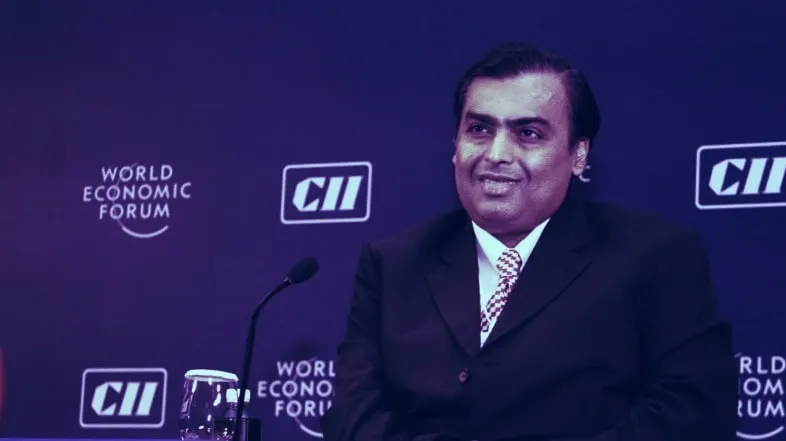In Brief
- Indian telecom operator Reliance Jio has announched a $5.7 billion investment from Facebook.
- The deal makes its founder, blockchain enthusiast Mukesh Ambani, the richest person in Asia.
- Facebook and Jio will target digital payments in India, specifically its 30 million neighbourhood shops.
Alibaba’s Jack Ma has been knocked off his perch as Asia’s richest person. The new incumbent is India’s Mukesh Ambani, chairman of sprawling oil-to-retail conglomerate Reliance Industries. On Wednesday, Reliance’s telecoms arm, Jio, received a whopping $5.7 billion from Facebook, in a deal that will change the game for digital payments in India.
The investment—Facebook’s biggest since it bought WhatsApp—saw Reliance stocks surge 10%—thus booting Ma off the top spot in the rich list. But it’s the long-term implications, particularly for digital payments, blockchain and crypto, that are most intriguing.
Under the agreement, Facebook's WhatsApp will help India’s mom-and-pop stores— almost 30 million of them—process digital payments. Ambani will gain a payment platform for his e-commerce unit and startup, JioMart, while Facebook gets a market with a population of 1.3 billion people as a testing ground for its payment services, and possibly even its digital currency initiative Libra.
Facebook wants to become “the Amazon of India"
Facebook and Jio both have an interest in helping India’s small businesses go digital, which is also a key goal for Libra.
The social media giant has identified the Indian market as one that’s primed for digital disruption. India is already its largest market (260 million users,) and also dominates Facebook-owned WhatsApp (400 million users). But it doesn’t bring in anything like as much revenue as North America.
The new deal, which gives Facebook 10% of Jio, will enable the US company to bring a big boost to digital commerce to India. It could, in fact, become the country’s Amazon.
Together, Facebook founder Mark Zuckerberg and Ambani can overcome a common issue. Both have e-payments services—JioMoney and WhatsApp Payments—which have failed to take off in a big way, so far. But their combined force, and access to massive reserves of data, will make a much bigger impression in a crowded payments market.
Their timing couldn’t be better. India’s lockdown has forced many to shop online for the first time. Jio recently launched ecommerce platform, JioMart, which allows consumers to source groceries and essentials from neighbourhood shops. Now, it will use WhatsApp to facilitate transactions, opening up immediate access to a customer-pool that competitors will find hard to beat.
India’s going digital, privately
With Jio, Ambani turbocharged Internet use in India. Aside from being the country’s largest telecoms operator (and the newly launched JioMart), Jio runs many digital and Internet businesses—in cloud computing, big data analytics, the internet of things, broadband, and blockchain.
In fact, last year it announced the world's largest blockchain network, targeting Jio’s 330 million users. Ambani emphasised, at the launch, that blockchain technology formed one of three main areas of expansion for Jio.
“Using blockchain, we also have an opportunity to invent a brand new model for data privacy, where Indian data, especially customer data, is owned and controlled by the Indian people and not by corporates, especially global corporations,” the billionaire said on the launch of Jio’s blockchain.
So Ambani could also help neutralise Facebook’s trust issues around user privacy, and add much-needed ballast to its position with India’s regulators. As elsewhere, the social media platform has come under fire over the spread of fake news on its platform and privacy concerns, and ran into opposition while trying to launch a payments feature inside WhatsApp in 2019.
What does the deal mean for cryptocurrency?
India’s tech community greeted the new deal with enthusiasm. Indian news outlet Crypto Kanoon prophesied a spillover effect on cryptocurrency, as more people in India start experimenting with digital assets, and possibly a “Jiocoin”.
India’s cryptocurrency space experienced a wave of optimism earlier this year, after the country’s Supreme Court forced the Reserve Bank of India to reverse its longstanding ban on banks’ dealings with crypto-related firms.
And unlike the West, where big tech is distrusted, Indians would welcome a digital currency backed by a giant like Facebook, a recent poll by central bank think tank OMFIF and Ipsos MORI suggested.
Analysts also told the Financial Times that the opportunities for data sharing, and gaining insights into spending or viewing habits, will provide rich fodder for advertising, and designing future joint ventures.
Ambani has mooted the possibility of opportunities for collaboration in everything from online education to healthcare, and, naturally, blockchain.
Daily Debrief Newsletter
Start every day with the top news stories right now, plus original features, a podcast, videos and more.

